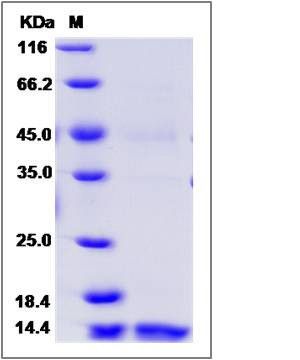Human CLEC7A / Dectin-1 / CLECSF12 Protein
BGR,CANDF4,CLECSF12,DECTIN1
- 100ug (NPP3743) Please inquiry
| Catalog Number | P10215-HNCH |
|---|---|
| Organism Species | Human |
| Host | Human Cells |
| Synonyms | BGR,CANDF4,CLECSF12,DECTIN1 |
| Molecular Weight | The recombinant human Dectin1 comprises 136 amino acids and has a predicted molecular mass of 15.5 kDa. The apparent molecular mass of the monomer is approximately 15 kDa in SDS-PAGE under reducing conditions. |
| predicted N | Thr 66 |
| SDS-PAGE |  |
| Purity | > 90 % as determined by SDS-PAGE |
| Protein Construction | A DNA sequence encoding the extracellular domain of the human Dectin1 (NP_072092.2) (Thr66-Met201) was expressed. |
| Bio-activity | |
| Research Area | Cancer |Invasion microenvironment |Adhesion molecule |Cell adhesion |Lectin |C-tyep lectin | |
| Formulation | Lyophilized from sterile PBS, pH 7.4. 1. Normally 5 % - 8 % trehalose and mannitol are added as protectants before lyophilization. Specific concentrations are included in the hardcopy of COA. |
| Background | Dectin-1 was recently identified as the most important receptor for beta-glucan. It is a type II transmembrane protein which binds beta-1,3 and beta-1,6 glucans, and is expressed on most cells of the innate immune system and has been implicated in phagocytosis as well as killing of fungi by macrophages, neutrophils and dendritic cells. Recognition of beta-glucan by dectin-1 triggers effective immune response, including phagocytosis and proinflammatory factor production, to eliminate infecting fungi, which especially benefits immunocompromised patients against opportunistic fungal infection. In addition, dectin-1 is involved in the adaptive immune response as well as autoimmune diseases and immune tolerance. Dectin-1 can recognize and respond to live fungal pathogens and is being increasingly appreciated as having a key role in the innate responses to these pathogens. In addition to its exogenous ligands, Dectin-1 can recognize an unidentified endogenous ligand on T cells and may act as a co-stimulatory molecule. Recent studies have highlighted the importance of Dectin-1 in anti-fungal immunity, in both mice and humans, and have suggested a possible involvement of this receptor in the control of mycobacterial infections. |
| Reference |
